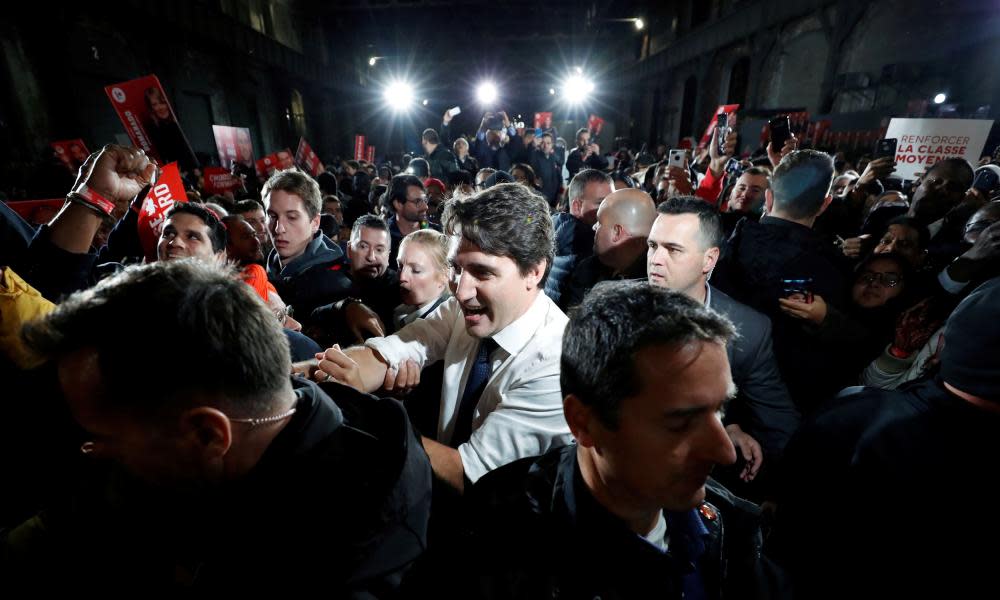Tight Canada election may offer power-broker role to smaller parties

As Canadians head to the polls on Monday, Justin Trudeau is bracing for the possibility of an electoral loss, marking a stunning turn of fortunes for the charismatic Liberal leader who had pledged to reshape the country’s politics.
With the the prime minister’s weakness exposed, smaller parties are fighting to emerge as power brokers in a general election that experts believe may produce no clear winner.
In the closing days of the campaign, Trudeau acknowledged that there was a good chance the opposition Conservatives could take more votes, but after 40 days of frantic campaigning, no party appears set to capture the 170 seats needed for a majority in the House of Commons.
“The race is very tight. I keep thinking I’m seeing the outcome – and then something happens that makes me believe maybe that’s not going to happen,” said Frank Graves, head of political polling firm Ekos Research Associates.
Part of the reason for the deadlock is a campaign which experts say was devoid of bold ideas from the two main parties, and was instead defined by self-inflicted wounds: images emerged showing Trudeau in blackface, while the Conservative leader, Andrew Scheer, was accused of concealing the fact that he also holds a US passport.
Related: Canada election: can Trudeau excite young voters let down by broken promises?
“There’s really been an absence of hard policy questions, even though it’s supposed to be the ‘climate change election’. It’s not like we don’t have anything to talk about,” said Lori Turnbull, a professor of political science at Dalhousie University. “Instead, we spent much of the campaign talking about blackface, stupid things people said on Twitter and Andrew Scheer’s citizenship.”
While the prime minister was quick to apologize over the blackface images, his rivals used the embarrassing revelations to accuse him of insincerity.
“Mr Trudeau, you are a phoney and you’re a fraud and you do not deserve to govern this country,” said Scheer during one official debate.
But Scheer, a social conservative, was also forced to deflect accusations that a Conservative government would undermine access to abortion, after telling reporters he was anti-choice.
He also faced repeated questions over his commitment to LGBTQ+ rights, after the Liberal party highlighted his previous opposition to gay marriage.
In the final days of the campaign, Jagmeet Singh, the leader of the leftwing New Democratic party, surged following well-received debate performances. The 40-year-old Singh has been able to draw large crowds with his optimistic campaign – and robbed much of the Green party’s support.
“Singh has come out of this election smelling like a rose,” said Graves. “He’s really put himself on the map.”
Despite the negative campaigning by both the Liberals and Conservatives, Trudeau has tried to centre the election around the environment, with the prime minister pitching himself as a climate leader facing down the Conservatives, who have pledged to repeal the country’s carbon tax.
Neither message, however, doesn’t appear to be resonating with voters.
“In an election where the government is going into its second term, it’s often a referendum on governance. But I don’t get that sense this time,” said Turnbull. “This election is really about a fractured polity – and probably, a fractured parliament.”
Trudeau will be looking to protect his position in Ontario and Quebec, which command a majority of parliament’s 338 seats.
Conservatives are expected to sweep much of the prairies, and are polling as high as 70% in the region. “It’s not going to produce many seats, but it’s going to leave a lot of very angry people in Alberta and Saskatchewan if they don’t see the outcome they’re hoping for,” said Graves.
Scheer’s ability to make inroads in the suburbs outside Toronto could be decisive.
Among the individual races, many eyes will be on Jody Wilson-Raybould and Jane Philpott, two former Liberal rising stars who were ejected from the party in the fallout of the SNC Lavalin scandal. The pair are both hoping to retain their seats as independents.
With a hung parliament the most likely outcome, Canada’s extensive – but unwritten – rules surrounding the Westminster system will come into play.
Scheer, who has rejected working with other parties in a minority government scenario, has staked out the position that the party with the most seats should be given the first chance at forming a government.
“It is clear that in modern Canadian history, the party with the most seats forms the government, and that a prime minister who comes out of an election with fewer seats than another party, resigns,” he said. “That is the convention.”
Experts disagree, citing extensive precedent in which the governing party did not command the plurality of seats.
“There is no truth to this suggestion by Andrew Scheer that there’s a modern convention around the prime minister resigning if he doesn’t come first,” said Turnbull. “The prime minister is the prime minister until he resigns.”

 Yahoo News
Yahoo News 
